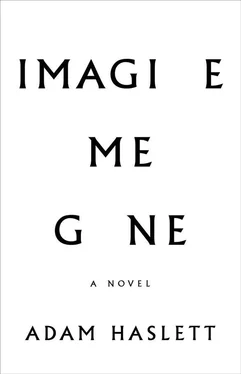Suffice it to say, between one thing and another, the social atmosphere on the ship has taken a hit. I see fewer people shopping in the jewelry store or getting their portraits taken, and I think some of the couples who got hitched on the crossing are wishing they’d just gone ahead with land-based weddings.
I have to run, though. Time for this new daily group-exercise thing that the captain has us doing. More soon, I promise.
Yours,
Michael
September 19
Dear Aunt Penny,
This trip bites! Now Mom’s got that Marburg virus,
the same one you were obsessed with last year!
She’s doing her best to stop the bleeding, but man is it a DRAG. Our situation is getting ridiculous. It seems that we’ll be parked here until virtually everyone has been auctioned off. And it’s not just the lifeboats now, either. Canoes, Boston whalers, a whole slew of small craft show up and barter with the crew, taking passengers right off the port-side service entrance. There are at least three other cruise liners anchored near us doing the same thing. Weird, right?
A few days ago a bunch of people just began to say, “Fuck it,” and started jumping off the ship. The Potteses’ tablemate Jill Sinclair jumped after her husband kicked it with the dengue (the ship doesn’t have a morgue so it’s all burial at sea, though I have to say the ceremonies have been getting progressively less elaborate). According to her husband, Mrs. Sinclair used to be a decent swimmer. Though apparently not good enough to outrun a shark herd. It was a full-on nature special. That gave some folks pause, though not everyone. It’s gotten to the point where the captain felt it necessary to order the crew to put up nets all around the edges of the ship, to prevent people calling it quits. I suppose it’s a public-health intervention of sorts, but I have to say it doesn’t offer much comfort.
To my shock, Celia has actually stopped reading about the Brontës, so she’s more available now, but still it’s getting pretty grueling. And she’s right: cannibalism
is
the biggest fear, followed by what are presumably less-than-ideal labor conditions in Angolan mines. Lots of people are saying it must be one of those African famines that has made this business a runner, but that’s just ignorant because the famines are usually in Ethiopia, and I don’t see how white tourists could be cheaper than rice. Truth be told, there’s not a lot of blubber left on these cruisers. Between the dysentery and whatever slop they’re buying in off the coast to feed us, they should advertise the trip as a weight-loss clinic. Alec is back down to twenty-three pounds, which has Mom out of her mind with worry. I just try to remind her that she needs to focus on her own bleeding. Alec will fatten up in no time once we get to England.
I told you about the mandatory exercise, right? I’m guessing it’s not Donna Summer’s favorite contract clause, singing some of her finest work to the remaining five hundred passengers crammed onto the stern pool area while the crew shouts through bullhorns for all of us to dance. And yet she brings to these performances something remarkable. I’d give my front teeth for a recording of yesterday’s rendition of “On the Radio.” Its opening piano and strings have always hovered between LA session-music schmaltz and the prelude to a tragedy, only to be redeemed by the purity of her voice in that first verse. But yesterday she reached higher still, a longing as clean as elation.
Someone found the letter you wrote me on the radio / And they told the world just how you felt…
By the time the beat came in, I could have sworn I saw tears in her eyes. Her makeup was running, like the mascara on many of the ladies in front of her, who still put their faces on each morning even though their clothes and luggage have been confiscated. They’re not the best dancers and can be quite lethargic, but yesterday I saw many of them close their eyes and begin moving their hips in time not to the drum machine but to the rhythm of her words.
When she reached the middle verse, that pool deck might as well have been the Paradise Garage at two a.m. on a Sunday, minus the gay and black people. She had that crowd of sun-charred crackers dancing like jackrabbits. They tripped on their chains but just got right back up again.
After this morning’s session (“Dim All the Lights” and “Bad Girls” followed by a “MacArthur Park” that left even the weary crew in tears) I passed a suite on 9 whose door had been left ajar, and there Donna was, kneeling at the foot of the bed, praying. I was more ashamed than ever to be dressed in nothing but my underpants. At any moment, her bodyguard would return from his toilet break and hustle me off. Still, something about the image of her at prayer arrested me and I couldn’t help watching.
At this late date, I suppose there’s no reason not to tell you that I have in fact (forgive the confession) “pleasured” myself a number of times to “Love to Love You Baby,” and not only to the drum track, but also to visions more particular to the artist herself. Apparently, she’s always considered herself plain and been highly self-conscious concerning her physical appearance. When I read that I felt closer to her, if only because I’m the same way. As I was peering at her through the slit in the door, Giorgio Moroder opened it wide and started at the sight of me. “Buzz off,” he said in an Italian accent. I didn’t think. I just reacted. “You’re the greatest producer of our age,” I said.
This took him aback, and for a moment he didn’t seem to know how to respond. He too had been shackled in leg irons. His striped linen pants were soiled and ragged. He asked me how much of his early, solo work I knew. All of it, I told him.
That’s Bubblegum, That’s Giorgio
(Hansa, 1969). Not exactly a seminal bubblegum album, but that’s not the point. Somewhere in there he was hearing what would lead him to the Moog synthesizer and the revolution in the sound of modern life, to a music that mirrors to an almost frightening degree the frictionless surface of commercial culture, but reminds us that it’s still human beings who are condemned to live in it, caught in the undertow of its melancholy. And so his first work, I told him in all honesty, is interesting in the way Picasso’s early academic realism might be to an art historian. He handed me a towel to cover myself and invited me into their suite.
He shut the bedroom door to give Donna her privacy and then told me this gig was like nothing they’d ever done before. “Bullshit,” he called it. He’s been bribing an officer to send telegrams to everyone in LA he can think of to try to get them airlifted out of here, but he suspects the messages are never sent. Donna apparently has a heart condition which is acting up. She was supposed to be in the studio five days ago, and her voice is at the breaking point. We talked a bit about Munich in the mid-seventies, the dilemma about whether to sign with Geffen, and how Donna wanted to move toward more of a rock sound on her next album. I wanted to tell him that they couldn’t control what they’d started, that the beats would only get faster and the synth more gorgeous, but this seemed presumptuous. I was worried the door might open and Donna might appear and I would be ugly and dumbstruck. So eventually I excused myself, and hustled back down to our cabins on 5.
To be honest, Aunt Penny, I’m not sure what will become of us now. We thought it was bad when Dad got shackled to Jim Pottes two days ago, making sleeping awkward for everyone, and then Dad woke up with Jim’s corpse locked to his ankle and wrist, dead with the Marburg that Mom presumably gave him. We lost half the morning cleaning up all that blood and mucus (except that little fidget-creature, Alec, who said he had a headache). I’d planned to do so much reading on this trip, and have got to practically none of it. In any case, at the rate the crew’s expiring I guess they’ll need someone to sail this puppy north again, so maybe I’ll have a chance to catch up then.
Читать дальше












